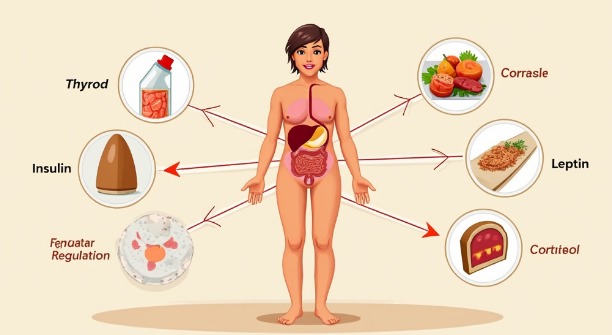Weight gain is a common concern that affects many people, often linked to hormonal imbalances and lifestyle factors. Gaining unwanted pounds can be frustrating and impact overall health and well-being. This article will explore the various causes of weight gain, its connection to hormones, and practical solutions to manage and prevent excessive weight gain.
Table of Contents
Key takeaways:
- Hormonal imbalances, particularly involving insulin, cortisol, and thyroid hormones, can contribute to weight gain
- Lifestyle factors like poor diet, lack of exercise, and inadequate sleep play a significant role in weight management
- Stress and certain medications can lead to unintended weight gain
- Hormone optimization therapy may help address weight gain related to hormonal imbalances
- Sustainable weight management involves a combination of healthy eating, regular exercise, and stress-reduction techniques
The Hormonal Connection to Weight Gain

W
Hormones play a crucial role in regulating metabolism, appetite, and fat storage. When hormones are out of balance, it can lead to unexpected weight gain. Here are some key hormones involved in weight regulation:
Insulin: The fat storage hormone
Insulin is responsible for regulating blood sugar levels and promoting fat storage. When insulin levels are consistently high, it can lead to insulin resistance, making it harder for the body to use glucose effectively. This can result in increased fat storage and weight gain.
Cortisol: The stress hormone
Cortisol, often called the stress hormone, can contribute to weight gain when levels are chronically elevated. High cortisol levels can increase appetite, especially for high-calorie foods, and promote fat storage around the midsection.
Thyroid hormones: Metabolism regulators
The thyroid gland produces hormones that regulate metabolism. An underactive thyroid (hypothyroidism) can slow down metabolism, leading to weight gain and difficulty losing weight.
Sex hormones: Estrogen and testosterone
Fluctuations in sex hormones, particularly during menopause for women and andropause for men, can affect body composition and lead to weight gain. Low testosterone in men and imbalanced estrogen levels in women can contribute to increased body fat.
Common Causes of Unexplained Weight Gain

While hormonal imbalances can be a significant factor in weight gain, there are other common causes to consider:
Poor diet and nutrition
Consuming a diet high in processed foods, added sugars and unhealthy fats can lead to weight gain over time. These foods are often calorie-dense but nutrient-poor, making it easy to overeat without feeling satisfied.
Lack of physical activity
A sedentary lifestyle is a major contributor to weight gain. Regular exercise helps burn calories, build muscle mass, and boost metabolism, all of which are essential for maintaining a healthy weight.
Inadequate sleep
Not getting enough quality sleep can disrupt hormones that regulate appetite and metabolism. This can lead to increased hunger, cravings for high-calorie foods, and reduced energy expenditure.
Chronic stress
Ongoing stress can lead to emotional eating, increased cortisol production, and poor sleep quality, all of which can contribute to weight gain.
Certain medications
Some medications, such as antidepressants, corticosteroids, and certain diabetes medications, can cause weight gain as a side effect.
The Role of Hormone Optimization in Weight Management

For individuals struggling with weight gain related to hormonal imbalances, hormone optimization therapy may be beneficial. This approach involves:
- Comprehensive hormone testing to identify imbalances
- Personalized treatment plans to address specific hormonal deficiencies or excesses
- Ongoing monitoring and adjustments to maintain optimal hormone levels
Hormone optimization can help:
- Improve metabolism
- Regulate appetite and cravings
- Enhance energy levels and motivation for physical activity
- Promote better sleep quality
- Reduce stress and improve mood
Lifestyle Strategies for Healthy Weight Management
While hormone optimization can be helpful, it’s essential to combine it with healthy lifestyle habits for effective weight management:
Balanced nutrition
Focus on a diet rich in whole foods, including:
- Lean proteins
- Fiber-rich fruits and vegetables
- Whole grains
- Healthy fats
Limit processed foods, added sugars, and excessive portion sizes.
Regular exercise
Aim for at least 150 minutes of moderate-intensity aerobic activity or 75 minutes of vigorous-intensity aerobic activity per week, along with strength training exercises at least twice a week.
Stress management techniques
Incorporate stress-reducing activities into your daily routine, such as:
- Meditation or mindfulness practices
- Deep breathing exercises
- Yoga or tai chi
- Regular social connections with friends and family
Prioritize sleep
Aim for 7-9 hours of quality sleep each night. Establish a consistent sleep schedule and create a relaxing bedtime routine to improve sleep quality.
The Importance of Professional Guidance
If you’re experiencing unexplained weight gain or struggling to lose weight despite lifestyle changes, it’s essential to seek professional guidance. A healthcare provider specializing in hormone health can:
- Conduct thorough hormone testing
- Identify underlying health conditions that may be contributing to weight gain
- Develop a personalized treatment plan that may include hormone optimization, nutrition counseling, and lifestyle recommendations
Understanding Body Composition Changes
It’s important to note that weight gain isn’t always a negative thing. In some cases, changes in body composition can lead to weight gain without necessarily indicating an increase in body fat. For example:
Muscle gain
If you’ve recently started a strength training program, you may notice an increase in weight due to muscle growth. Muscle tissue is denser than fat tissue, so it’s possible to gain weight while improving your body composition.
Water retention
Factors such as increased sodium intake, certain medications, or hormonal fluctuations can cause temporary water retention, leading to a temporary increase in weight.
The Psychological Impact of Weight Gain
Unexpected weight gain can have significant psychological effects, including:
- Decreased self-esteem and body image issues
- Increased stress and anxiety
- Depression or mood changes
- Social withdrawal
It’s crucial to address these psychological aspects alongside physical health when dealing with weight gain. Consider seeking support from a mental health professional if you’re struggling with the emotional impact of weight changes.
The Role of Gut Health in Weight Management
Emerging research suggests that the gut microbiome plays a significant role in weight regulation. A healthy gut can contribute to better weight management by:
- Improving nutrient absorption
- Regulating appetite hormones
- Reducing inflammation
To support gut health:
- Eat a diverse range of fiber-rich foods
- Include fermented foods in your diet
- Consider probiotic supplements under the guidance of a healthcare provider
The Impact of Environmental Factors on Weight
Environmental factors can also contribute to weight gain:
Endocrine disruptors
Certain chemicals found in plastics, pesticides, and other environmental toxins can disrupt hormone function and potentially contribute to weight gain.
Food environment
Living in an area with limited access to healthy food options (food deserts) or an abundance of fast-food restaurants can make it challenging to maintain a healthy diet.
Sedentary work environments
Jobs that require long periods of sitting can contribute to a more sedentary lifestyle, making it harder to maintain a healthy weight.
The Role of Genetics in Weight Gain
While lifestyle factors play a significant role in weight management, genetics can also influence an individual’s tendency to gain weight. Some people may be more genetically predisposed to weight gain or have a harder time losing weight due to their genetic makeup.
However, it’s important to note that having a genetic predisposition to weight gain doesn’t mean it’s inevitable. Lifestyle factors and hormone optimization can still have a significant impact on weight management, even for those with a genetic tendency towards weight gain.
The Importance of Sustainable Weight Management
When addressing weight gain, it’s crucial to focus on sustainable, long-term strategies rather than quick fixes or fad diets. Crash diets or extreme measures may lead to temporary weight loss but often result in weight regain and potential health issues.
Instead, focus on:
- Gradual, steady weight loss (if needed)
- Building healthy habits that can be maintained long-term
- Addressing underlying hormonal imbalances or health issues
- Improving overall health and well-being, rather than just focusing on the number on the scale
The Role of Nutritional Supplements in Weight Management
While a balanced diet should be the primary source of nutrients, certain supplements may support weight management efforts:
| Supplement | Potential Benefits | Considerations |
|---|---|---|
| Omega-3 fatty acids | May help reduce inflammation and support metabolism | Choose high-quality fish oil or algae-based supplements |
| Vitamin D | Can help regulate appetite and support hormone function | Get levels tested before supplementing |
| Chromium | May help regulate blood sugar and reduce cravings | Consult with a healthcare provider before use |
| Green tea extract | May boost metabolism and support fat oxidation | Be cautious with caffeine content |
| Hormone | Role in Weight Management | Potential Imbalance Symptoms |
|---|---|---|
| Insulin | Regulates blood sugar and fat storage | Increased hunger, difficulty losing weight |
| Cortisol | Affects metabolism and fat distribution | Abdominal weight gain, fatigue |
| Thyroid hormones | Control metabolism rate | Unexplained weight gain, fatigue, cold intolerance |
| Estrogen | Influences fat distribution and metabolism | Weight gain, particularly around hips and thighs |
| Testosterone | Supports muscle mass and metabolism | Increased body fat, decreased muscle mass |
Always consult with a healthcare provider before starting any new supplement regimen.
Tracking Progress Beyond the Scale
When managing weight, it’s important to look beyond just the number on the scale. Other metrics to consider include:
- Body measurements (waist circumference, hip-to-waist ratio)
- Body fat percentage
- Energy levels and mood
- Sleep Quality
- Physical fitness improvements (strength, endurance)
- Clothing fit
By focusing on these various aspects of health and well-being, you can get a more comprehensive picture of your progress and overall health improvements.
Conclusion:
Understanding and addressing weight gain requires a comprehensive approach that considers hormonal health, lifestyle factors, and individual needs. By combining hormone optimization therapy with sustainable lifestyle changes, it’s possible to achieve and maintain a healthy weight while improving overall well-being.
Remember that everyone’s journey is unique, and what works for one person may not work for another. Be patient with yourself, focus on progress rather than perfection, and don’t hesitate to seek professional guidance when needed. With the right approach and support, you can navigate the challenges of weight management and achieve your health goals.


